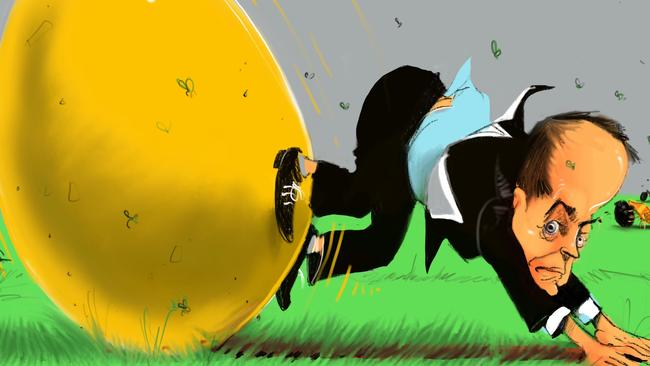
The game is up. Labor’s call for a banking royal commission is a campaign of convenience that serves the interests of its chums in the industry superannuation funds. Forget the tosh about standing up for the workers. The party of John Curtin and Ben Chifley is currying favour from the big end of town, the privileged and opaque sector of the finance industry that sits on a half-trillion dollars of our savings.
Labor’s questionable motives for attacking the banks are laid bare in a multi-million-dollar advertising campaign by Industry Super Australia.
Cue scary music, kiddies peering anxiously over the bedsheets and a gravelly voice-over straight out of the trailer for Invasion of the Body Snatchers.
“The big banks want to get their hands on your super and they’re putting pressure on our federal politicians to let them in.”
Labor believes in competition policy but hates competitors who nibble away at the magic pudding it bequeathed to its mates. The union movement’s stranglehold on superannuation is one of many critical flaws in Paul Keating’s over-regimented retirement income scheme.
The bottom line is that it is a lousy deal for workers who have had their wages docked for more than a quarter of a century and find themselves stuck on a modest state pension.
On the other hand, it is a handy lurk for union hacks who supplement their salaries by joining an industry super fund board.
Cbus, the default superannuation fund for construction workers, paid $1.3 million to its directors in 2015-16. Glenn Thompson of the Australian Manufacturing Workers Union picked up $133,000: the Construction Forestry Mining and Energy Union’s Rita Mallia $66,000; ACTU president Ged Kearney $52,000; Misha Zelinsky of the Australian Workers Union $59,000; and the CFMEU’s Frank O’Grady $47,000.
On it goes. Plumbers union boss Earl Setches, a pal of Bill Shorten implicated in a massive ALP branch-stacking scam, pocketed $66,500. Dave Noonan — the one who organises illegal blockades of children’s hospitals, not the breakfast host on Hobart’s Triple M — received more than $55,000.
Chairman Steve Bracks, the former Victorian Labor premier, collected $155,000. Cbus’s token “independent” director — former Labor federal minister John Dawkins — was paid $113,000.
So perhaps it is time to support the Opposition Leader’s call for a royal commission into the finance industry, one that illuminates the murky world of industry superannuation as well as the misdemeanours of the banks.
The banks, after all, are listed companies, overseen by boards that must answer to shareholders, front up to annual general meetings and are bound by rules of continuous disclosure.
The punishment for mistakes is merciless. Billions have been wiped from the value of Commonwealth Bank shares even before the Australian Securities & Investments Commission inquiry is barely under way.
Industry superannuation funds, however, enjoy a level of governance that would raise eyebrows if it applied to the local bowls club. No one gets to ask why, for example, the funds and associated entities have paid more than $53m to trade unions in the past decade. There is no opportunity to challenge the dominance of organised labour on boards. Trade unionists who represent less than 10 per cent of the private sector workforce are hardly in a position to represent the interests of the majority of contributors.
We have precious little information on which to judge collectively owned bodies such as Industry Super Holdings, which owns a bank, a funds management company, a financial advisory service, a mortgage broker, a credit control business and a spectacularly boring online newspaper that turned an investment of $12m into $3m in the space of three years.
The Heydon Royal Commission into Trade Union Governance and Corruption barely scratched the surface, but what it did discover was alarming.
TWU Super was discovered to have paid its sponsoring union more than $4.6m from members’ retirement savings.
LUCRF contributed to a slush fund operated by the National Union of Workers, which in turn donated to Shorten’s campaign to become ALP leader.
Recently, under questioning from senator Jane Hume, ASIC was obliged to examine one CFMEU-controlled fund that had appointed a chief executive who left the NSW public service after a referral from the NSW Independent Commission Against Corruption. The details of his alleged behaviour have never been publicly disclosed.
It is no wonder that under political pressure in 2015 to reform their governance practices by appointing independent directors, Labor and industry funds lobbied — and succeeded — in maintaining the status quo. In doing so they crossed the line from acting out of pure self-interest to engaging in partisan political debate.
The high-rotation “fox and the henhouse” advertising campaign, funded from its members’ retirement savings, is a direct assault on the Prime Minister.
Why? Because Malcolm Turnbull’s government is bent on introducing legislation that will enforce a degree of transparency giving retirement savers insights about the way their retirement savings are being used and abused.
Funds may be compelled to disclose when assets are transferred to third parties, explain the purpose of the transaction and the benefit — or lack thereof — for retirement savers.
Were such legislation already in place, industry funds controlled by the CFMEU would have to explain why they gave $12.5m to the law-breaking union, which in turn is a generous donor to the Labor Party.
AustralianSuper would have been obliged to explain why, for example, it paid $27,500 to the AWU and whether the transaction was connected with the $25,000 the AWU subsequently contributed to Shorten’s 2007 campaign for the seat of Maribyrnong.
Meanwhile, if the Turnbull government were able to muster a fraction of Labor’s audacity, it might care to ask a hand-picked commissioner to investigate this murky payment.
The commission might call evidence from the AWU’s national secretary at the time, one WR Shorten, who also happened to be a director of AustralianSuper.
A royal commission? Bring it on.
Nick Cater is executive director of the Menzies Research Centre.


